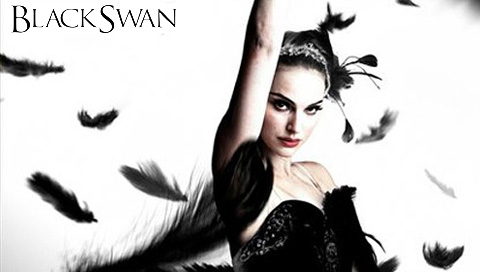Star Rating: 4/5
Obsession is a dangerous mindset to fall into. It has the power to consume its victim, and drive him or her to madness. Black Swan may look like it is about ballerinas and Ballet in general, but it is not: it is about obsession, and the psychological effects and the physical strains it can cause someone. Yet, if the film meant to tackle these complex issues acutely, it goes preposterously too far to be taken seriously.
The movie is viewed through the eyes of Nina (Natalie Portman – Star Wars I– III, Brothers, Your Highness), an innocent, pretty but mentally unstable ballerina, who lives with her domineering mother (Barbara Hershey – Falling Down, Hannah and her Sisters). Nina has seemingly devoted her whole life to becoming Odette, the White Swan, in Tchaikovsky’s Swan Lake. But the company she works for has made a slight altercation to the performance: the girl who plays Odette will also have to play her evil twin-sister, Odile, the Black Swan. Whilst Nina fits the role of the White Swan perfectly, she has to learn how to become manipulative and provocative in order to play the Black Swan.

Thomas urging Nina to ‘feel’ and ‘respond’ to his touch as the latter needs to learn how to become the Black Swan.
Nina is determined to play both roles flawlessly. But her obsession with perfection exposes her already fragile mind, as well as her various insecurities. It is not long before reality and Nina’s perceptions of reality (hallucinations?) start to thread together to look like one and the same. Paranoia goes hand in hand with this too. A younger and, perhaps, even more beautiful girl, called Lily (Mila Kunis – Family Guy, Forgetting Sarah Marshall, Friends with Benefits), joins the company making Nina believe that she is going to be replaced as the lead performer. Consequently, Nina works ever harder, pushing herself to the brink (and beyond), in order to please and convince her demanding boss, Thomas (Vincent Cassels – La Haine, Derailed, Trance), that she is right for the dual role. Regardless of the personal cost.
The acting in Black Swan, across the board, is exceptional. Natalie Portman is without a doubt the star of the show. Portman captures the mental anguish that Nina goes through with remarkable consistency and concentration. One is never sure what mental state Nina is in, or what is real and what is not real with her. Portman is solely responsible for this and rightly deserves the credit.
This is not to say that Mila Kunis, Barbara Hershey or Vincent Cassels do themselves an injustice; far from it. But Portman’s performance as Nina is Oscar-winning material. It has also finally enabled her to remove the shackles from her piteous performance as Padmé in Star Wars I, II and III. Yes, Portman’s performances in Closer and Brothers showed us that she had the potential to be a great actor, but in Black Swan she reveals that she has more than just mere potential with stunning effect.
It is not just the acting that is superb throughout the movie. The director, Darren Aranofsky (Pi, Requiem for a Dream, The Wrestler) has done the choreography and the music brilliantly too. As a result, just like in Pi and Requiem, the disturbing nature of Black Swan has the maximum effect upon the audience. (Think of the masturbation or the lesbian-sex scenes to mention but two.)
The travesty for Black Swan is that it is neither as intense nor as shocking as it should have been. It is certainly not in the same league as Requiem. Whilst Requiem is harrowingly realistic, Black Swan becomes a little farcical towards the end. This is a pity for cast and director alike. It is unlikely that Aranofsky, judging by his previous works, intended to turn this movie into a pantomime.
These are by no means the only flaws in Black Swan either. Although the film hints at how dedicated one must be to become a top ballerina, it fails to detail the positive aspects of the industry. Instead, the movie focuses upon many of the negative stereotypes, such as eating disorders and overbearing parents. (Apparently, much of these are out of date in the West.)
Black Swan is by no means an objective portrayal of the Ballet world. The film also lacks the jaw-dropping, stomach-churning ability of Requiem. Then again, Black Swan is still a very entertaining psychological thriller and is quite distressing. Moreover, the acting is of the highest quality. Few actors will better Natalie Portman’s performance over the coming year, and she rightly deserves the nominations and awards she is receiving. It is just a shame for her and Aranofsky that audiences have laughed more at the absurdity of Nina’s descent, than taken note of the possible consequences of obsession.
PG’s Tips



Good review – very detailed and contemplative of the major themes.
Excellent review, I agree with you regarding Nina’s spiral into madness – it covered up some real messages. It was difficult at times to identify whether her hardships/experiences were real or imagined.
And glad you liked my review of Black Sawn too! http://wp.me/p1NhQm-51
I liked Black Swan, wouldn’t say I loved it, but has grown on me on the 2nd viewing.
I agree that Requiem is the better film, and has more of a wow-factor. In fact, I quoted you in my Black Swan review yesterday:
http://moviesandsongs365.blogspot.com/2012/03/film-review-black-swan-2010.html
Thanks for reading my review and quoting me. I am flattered, truly.
I agree with many of your points, but believe that the movie works on a level that might not at first be apparent. In fact I believe it is a masterpiece experientially and on more profound levels. I will not elaborate here but offer my full review:
http://sasoc.wordpress.com/2010/12/23/genius-in-action-the-black-swan/
And also here:
http://sasoc.wordpress.com/2011/01/02/more-black-swan/